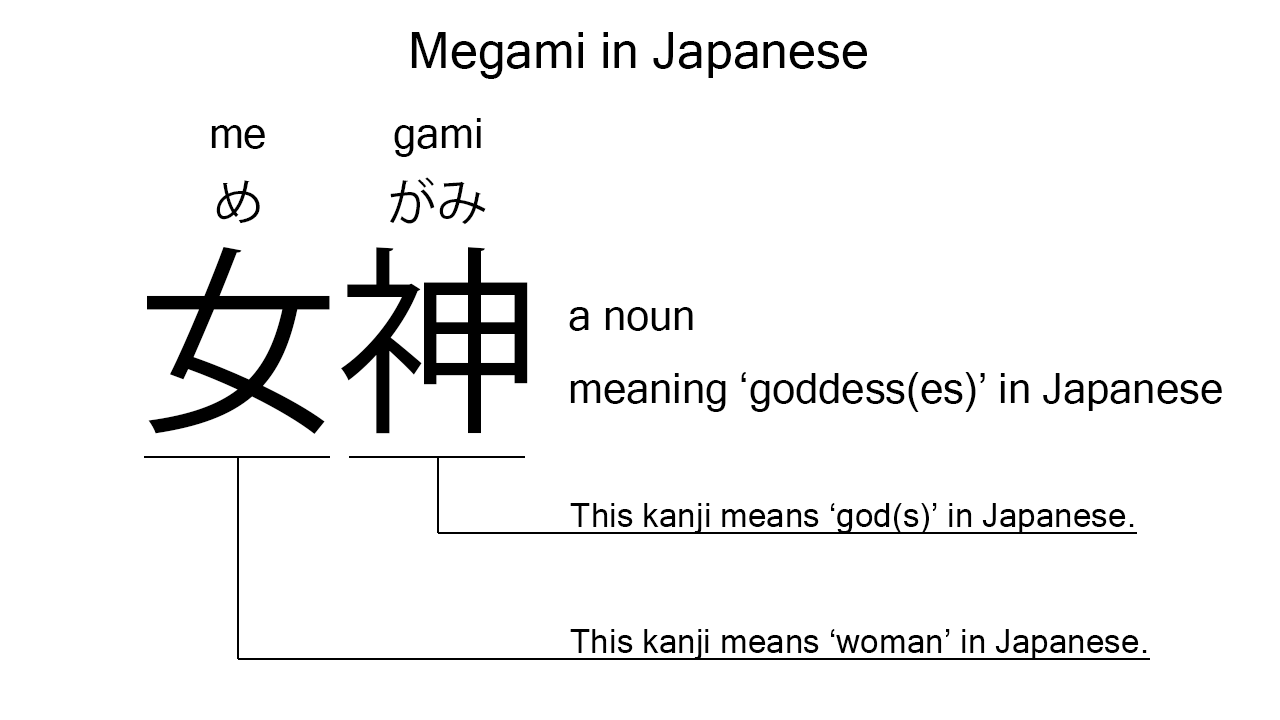What does “megami” mean in Japanese?
Native speakers use megami to mean a ‘goddess’ in Japanese. Perhaps, some Japanese learners know this word as it is sometimes used in Japanese movies, video games, songs, novels, manga, anime, and the like. In this blog post, however, I’m explaining this word in detail based on its kanji expression. And also, I’m explaining how to use it through example sentences. My explanations would help Japanese learners understand megami more clearly. Then, let’s get started!
Contents
Definition and meaning of “megami”
Let me start with the definition and meaning of megami.
- megami – 女神 (めがみ) : a noun meaning a ‘goddess’ in Japanese. This can also work as plural. Learn more about Japanese plural.
The definition and meaning are simple and clear. To understand this noun more clearly, however, let me explain its kanji characters in detail, one by one.
Japanese kanji for ‘goddess’
The Japanese kanji expression for goddess consists of the following two kanji characters:
- 女 : a kanji character widely used to mean a ‘woman’ or ‘female’ in Japanese.
- 神 : a kanji character widely used to mean a ‘god’ in Japanese.
From these two kanji characters, we can understand that megami literally means a ‘woman god’ in Japanese. This literal interpretation is completely in line with the actual meaning.

When we meet new kanji expressions, we should check their kanji characters in detail to understand their meanings clearly and deeply. In many cases, kanji characters tell us a lot about the meanings of the expressions they form. Actually, here, we could get the better understanding of megami through the detailed kanji check above.
So far, I’ve explained the definition and meaning of megami together with its kanji characters. Then, let me explain how to use it through the example sentences below.
How to say “goddess” in Japanese
boku wa yume de megami wo mi ta – 僕は夢で女神を見た (ぼくはゆめでめがみをみた)
I saw a goddess in my dream.
Below are the new words used in the example.
- boku – 僕 (ぼく) : a pronoun meaning ‘I’ in Japanese. This is used mainly by boys and young males.
- wa – は : a binding particle working as a case marker or topic marker. In the example, this works after boku to make the subject in the sentence.
- yume – 夢 (ゆめ) : a noun meaning a ‘dream’ in Japanese. This can also work as plural.
- de – で : a case particle used to say where someone does something. In the example, this is used after yume to say where the speaker saw the goddess.
- wo – を : a case particle used to make the object word in a sentence. In the example, this is used after megami to make the object in the sentence.
- mi – 見 (み) : one conjugation of the verb, miru, which means ‘to see’ or such in Japanese. In the example, it has been conjugated for the better connection with its following word.
- ta – た : an auxiliary verb used after a verb, adjective, or auxiliary verb to make its past tense form. In the example, this is used after mi to make its past tense form, mi ta.
This is a typical usage of megami. In this example, it works together with the case particle, wo, to become the object in the sentence. When we want to mean a ‘goddess’ in Japanese, anyway, this noun is a very good option.
Another example of “megami”
kanojo wa watashi no megami desu – 彼女は私の女神です (かのじょはわたしのめがみです)
She is my goddess.
Below are the new words used in the example sentence.
- kanojo – 彼女 (かのじょ) : a pronoun meaning ‘she’ in Japanese.
- watashi – 私 (わたし) : a pronoun meaning ‘I’ in Japanese.
- no – の : a case particle used after a noun or pronoun to make its possessive case. In the example, this is used after watashi to make its possessive case, watashi no, which means ‘my’ in Japanese.
- desu – です : an auxiliary verb used after a noun or adjective to make it polite. Probably, this is well known as a part of Japanese desu form. In the example, this is used after the noun phrase, watashi no megami, to make it sound polite.
This is another example of megami. In this example, it works as a part of the noun phrase, watashi no megami, which means ‘my goddess’ in Japanese. Japanese native speakers sometimes use this noun as a metaphor for a beautiful woman.
Summary
In this blog post, I’ve explained the definition and meaning of megami in detail based on its kanji expression. And also, I’ve explained how to use it through the example sentences. Let me summarize them as follows.
- megami – 女神 (めがみ) : a noun meaning a ‘goddess’ in Japanese. This can also work as plural. These two kanji characters literally mean a ‘woman god’ in Japanese. This literal interpretation is completely in line with the actual meaning. It’s also worth mentioning here that Japanese native speakers sometimes use this noun as a metaphor for a beautiful woman.
Hope my explanations are understandable and helpful for Japanese learners.
Leave a Reply